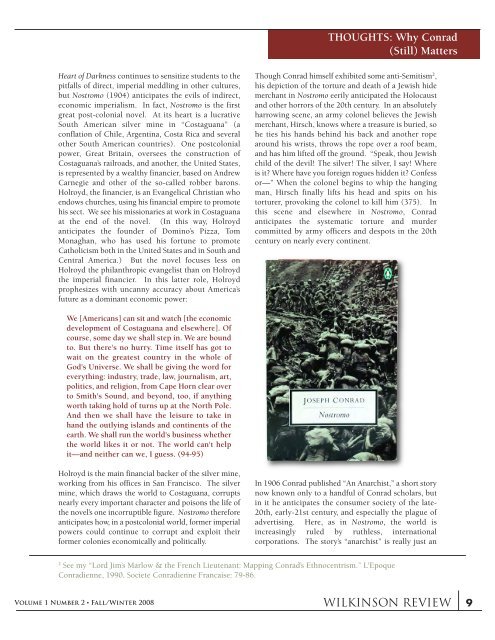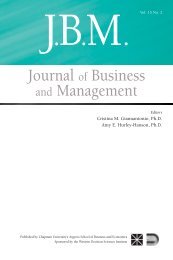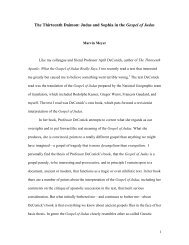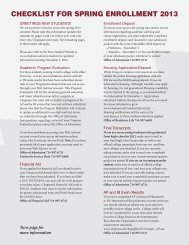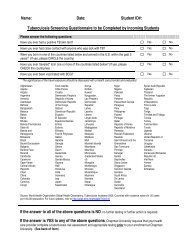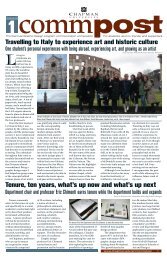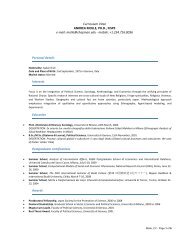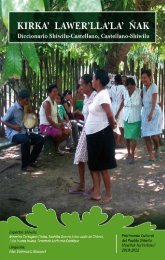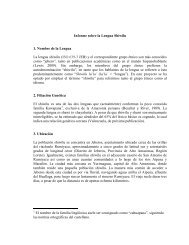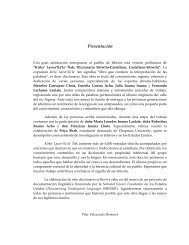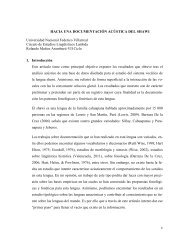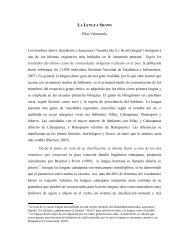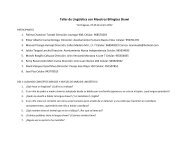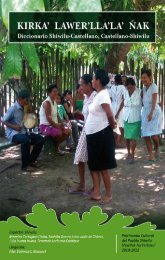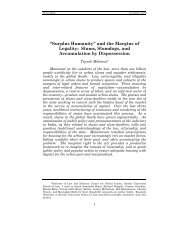WILKINSON COLLEGE MAGAZINE also - Chapman University
WILKINSON COLLEGE MAGAZINE also - Chapman University
WILKINSON COLLEGE MAGAZINE also - Chapman University
Create successful ePaper yourself
Turn your PDF publications into a flip-book with our unique Google optimized e-Paper software.
Heart of Darkness continues to sensitize students to the<br />
pitfalls of direct, imperial meddling in other cultures,<br />
but Nostromo (1904) anticipates the evils of indirect,<br />
economic imperialism. In fact, Nostromo is the first<br />
great post-colonial novel. At its heart is a lucrative<br />
South American silver mine in “Costaguana” (a<br />
conflation of Chile, Argentina, Costa Rica and several<br />
other South American countries). One postcolonial<br />
power, Great Britain, oversees the construction of<br />
Costaguana’s railroads, and another, the United States,<br />
is represented by a wealthy financier, based on Andrew<br />
Carnegie and other of the so-called robber barons.<br />
Holroyd, the financier, is an Evangelical Christian who<br />
endows churches, using his financial empire to promote<br />
his sect. We see his missionaries at work in Costaguana<br />
at the end of the novel. (In this way, Holroyd<br />
anticipates the founder of Domino’s Pizza, Tom<br />
Monaghan, who has used his fortune to promote<br />
Catholicism both in the United States and in South and<br />
Central America.) But the novel focuses less on<br />
Holroyd the philanthropic evangelist than on Holroyd<br />
the imperial financier. In this latter role, Holroyd<br />
prophesizes with uncanny accuracy about America’s<br />
future as a dominant economic power:<br />
We [Americans] can sit and watch [the economic<br />
development of Costaguana and elsewhere]. Of<br />
course, some day we shall step in. We are bound<br />
to. But there's no hurry. Time itself has got to<br />
wait on the greatest country in the whole of<br />
God's Universe. We shall be giving the word for<br />
everything: industry, trade, law, journalism, art,<br />
politics, and religion, from Cape Horn clear over<br />
to Smith's Sound, and beyond, too, if anything<br />
worth taking hold of turns up at the North Pole.<br />
And then we shall have the leisure to take in<br />
hand the outlying islands and continents of the<br />
earth. We shall run the world's business whether<br />
the world likes it or not. The world can't help<br />
it—and neither can we, I guess. (94-95)<br />
Holroyd is the main financial backer of the silver mine,<br />
working from his offices in San Francisco. The silver<br />
mine, which draws the world to Costaguana, corrupts<br />
nearly every important character and poisons the life of<br />
the novel’s one incorruptible figure. Nostromo therefore<br />
anticipates how, in a postcolonial world, former imperial<br />
powers could continue to corrupt and exploit their<br />
former colonies economically and politically.<br />
Though Conrad himself exhibited some anti-Semitism 2 ,<br />
his depiction of the torture and death of a Jewish hide<br />
merchant in Nostromo eerily anticipated the Holocaust<br />
and other horrors of the 20th century. In an absolutely<br />
harrowing scene, an army colonel believes the Jewish<br />
merchant, Hirsch, knows where a treasure is buried, so<br />
he ties his hands behind his back and another rope<br />
around his wrists, throws the rope over a roof beam,<br />
and has him lifted off the ground. “Speak, thou Jewish<br />
child of the devil! The silver! The silver, I say! Where<br />
is it? Where have you foreign rogues hidden it? Confess<br />
or—” When the colonel begins to whip the hanging<br />
man, Hirsch finally lifts his head and spits on his<br />
torturer, provoking the colonel to kill him (375). In<br />
this scene and elsewhere in Nostromo, Conrad<br />
anticipates the systematic torture and murder<br />
committed by army officers and despots in the 20th<br />
century on nearly every continent.<br />
In 1906 Conrad published “An Anarchist,” a short story<br />
now known only to a handful of Conrad scholars, but<br />
in it he anticipates the consumer society of the late-<br />
20th, early-21st century, and especially the plague of<br />
advertising. Here, as in Nostromo, the world is<br />
increasingly ruled by ruthless, international<br />
corporations. The story’s “anarchist” is really just an<br />
2 See my “Lord Jim’s Marlow & the French Lieutenant: Mapping Conrad’s Ethnocentrism.” L'Epoque<br />
Conradienne, 1990. Societe Conradienne Francaise: 79-86.<br />
Volume 1 Number 2 • Fall/Winter 2008<br />
THOUGHTS: Why Conrad<br />
(Still) Matters<br />
<strong>WILKINSON</strong> REVIEW<br />
9


